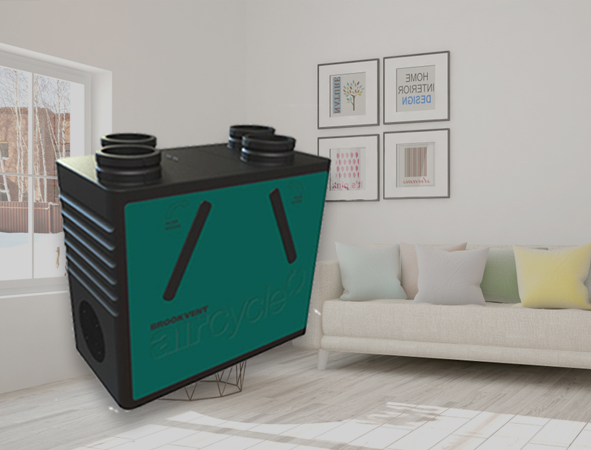As we spend more and more time indoors, the quality of our living spaces can have a significant impact on our overall well-being. From the air we breathe to the way we feel, our homes can either nourish or harm us. One crucial aspect of indoor living that is often overlooked is ventilation. Mechanical Ventilation systems go beyond mere air circulation, providing a healthy, safe, and comfortable indoor environment that can greatly impact our daily lives. By removing stale air, pollutants, and moisture, these systems can alleviate symptoms of indoor air pollution, such as headaches, fatigue, and respiratory issues. Moreover, they can also reduce the risk of mould growth, eliminate unpleasant odours, and create a more balanced and stable indoor climate. In this post, we’ll delve into the benefits of mechanical ventilation and explore how it can be a game-changer for achieving healthy homes and happy lives.
The importance of indoor air quality
The air we breathe is essential to our well-being, and yet, it’s often overlooked and underestimated. While we spend a significant amount of time indoors, the quality of the air we breathe can have a profound impact on our health and comfort. Indoor air quality (IAQ) is a critical factor that can affect our mood, energy levels, and overall quality of life. In fact, the World Health Organization (WHO) estimates that indoor air pollution is responsible for millions of premature deaths worldwide each year.
Poor IAQ can occur when there is a buildup of pollutants such as airborne particles, gases, and biological contaminants in the air. These pollutants can come from a variety of sources, including building materials, furniture, and household products, as well as outdoor pollutants that can seep into the home. When we breathe in polluted air, it can lead to a range of symptoms, from mild discomfort to serious health problems. Respiratory issues, headaches, and fatigue are all common complaints associated with poor IAQ.
Fortunately, there is a solution to this problem: mechanical ventilation. By installing a mechanical ventilation system, you can ensure that your home is equipped with a reliable and efficient way to remove pollutants and stale air and bring in fresh, clean air. This is especially important for homes that are prone to moisture issues, such as those with poor insulation or those near water sources. With mechanical ventilation, you can enjoy the benefits of a healthier, happier home where you can breathe easily and feel comfortable.
The consequences of poor indoor air quality
Understanding the Risks:
Indoor air quality is often overlooked, yet it plays a vital role in our health. Poor ventilation and pollutant buildup can lead to various health issues, including headaches, fatigue, and respiratory problems.
Health Impacts:
Adverse effects of poor indoor air quality range from mild discomfort to serious respiratory conditions like asthma. Additionally, the growth of mould and mildew due to inadequate ventilation can worsen air quality and cause odours and stains.
Mental Health Consequences:
Beyond physical health, indoor air quality can affect mental well-being. Studies show a link between poor air quality and increased stress, anxiety, and depression. Our brains respond to the environment, and clean air is crucial for a healthy mindset.
Creating a Healthy Environment:
Addressing indoor air quality requires proper ventilation systems, regular maintenance, and awareness of potential pollutants. By prioritizing clean air at home, we can safeguard our health and enhance overall well-being.
What is mechanical ventilation, and how does it work?
At the heart of creating a healthy and comfortable home lies a crucial component: mechanical ventilation. This innovative system is designed to improve indoor air quality by exchanging stale air for fresh, clean air while also maintaining a consistent temperature and humidity level. So, what is mechanical ventilation, and how does it work its magic?
Mechanical ventilation systems use a combination of fans, motors, and ducts to circulate and filter the air within your home. These systems can be controlled remotely, allowing you to adjust the airflow to suit your needs and preferences. By constantly removing pollutants, allergens, and moisture from the air, mechanical ventilation helps to prevent the buildup of unhealthy indoor environments.
The process begins with the installation of vents, grilles, and diffusers throughout your home, which work in tandem with a central control unit. As stale air accumulates, it is drawn into the system and redirected to the outside, where it is replaced with fresh air from the outside. This continuous exchange of air creates a circulation of clean air that not only eliminates odours and pollutants but also helps to regulate the temperature and humidity levels within your home.
Benefits of mechanical ventilation for indoor health
Understanding the Risks:
Poor indoor air quality can lead to a range of health issues, from minor irritations to more severe respiratory problems. Identifying and addressing the symptoms of poor air quality can be challenging without proper ventilation systems in place.
How Mechanical Ventilation Works:
Mechanical ventilation systems circulate and exchange stale air with fresh air from outside, reducing the concentration of pollutants and contaminants indoors. This process helps alleviate respiratory symptoms and reduces the risk of mould and mildew growth.
Regulating Indoor Environment:
In addition to improving air quality, mechanical ventilation systems help regulate indoor temperature and humidity levels. By removing excess moisture and heat, they prevent condensation and water damage, creating a more comfortable living space and reducing the risk of pest infestations.
Promoting Health and Comfort:
With mechanical ventilation systems, homeowners can breathe easier and live more comfortably, knowing that their indoor air quality is being effectively managed. Investing in these systems is essential for maintaining a healthy and enjoyable living environment.
Benefits of Mechanical Ventilation for indoor comfort
Imagine walking into a home that feels fresh and invigorating, with a crisp, clean scent that’s a far cry from the stale, musty air that can often plague indoor spaces. This is the reality of Mechanical Ventilation, a game-changing technology that can revolutionize the way we live and breathe indoors. By circulating fresh air and removing stale, polluted air, mechanical ventilation systems create a healthier and more comfortable living environment.
No longer will you have to suffer through the discomfort of stagnating air, heavy with the scent of cooking, pets, or mould. With mechanical ventilation, you’ll enjoy a constant flow of fresh air that’s free from pollutants and allergens, making it easier to breathe and relax. This is especially important for people who suffer from respiratory issues, such as asthma, or those who are sensitive to indoor air quality.
However, the benefits of mechanical ventilation continue beyond there. By removing stale air and humidity, these systems can also help to prevent the growth of mould and mildew, which can lead to costly repairs and even health problems. By promoting a consistent flow of fresh air, mechanical ventilation can help reduce the buildup of pollutants and odours, making your home smell fresh and clean.
The difference between mechanical ventilation and natural ventilation
When it comes to maintaining a healthy and comfortable indoor environment, the question of ventilation often arises. Many homeowners may need clarification about the best approach to ensure their air is fresh and free from pollutants. The answer lies in understanding the difference between mechanical ventilation and natural ventilation.
Natural ventilation, as the name suggests, relies on the natural movement of air through buildings, such as through windows, doors, and gaps. While it can be effective in some situations, it can also be unpredictable and may not provide a consistent flow of fresh air. Moreover, natural ventilation can be compromised by factors such as weather conditions, building design, and occupancy levels, which can lead to indoor air quality issues.
Mechanical ventilation, on the other hand, is a controlled system that uses fans, ducts, and other components to circulate and exchange indoor air. This type of ventilation provides a consistent and reliable flow of fresh air, which can be especially important in buildings with high occupancy rates, poor insulation, or limited natural ventilation options. Mechanical ventilation systems can also be designed to remove pollutants and contaminants from the air, making them a crucial component of a healthy indoor environment.
How to maintain and clean your mechanical ventilation system
A well-maintained mechanical ventilation system is essential to reap the benefits of improved indoor air quality and enhanced comfort. Regular maintenance and cleaning are crucial to ensure that your system functions optimally and effectively and removes pollutants, allergens, and moisture from the air. Neglecting to perform these tasks can lead to a buildup of dirt, dust, and other contaminants, which can compromise the system’s performance and even lead to the growth of mould and bacteria.
To maintain and clean your mechanical ventilation system, start by checking the owner’s manual or manufacturer’s instructions for specific guidance. Typically, this involves cleaning the filters, coils, and other components on a regular schedule. You should also inspect the system’s ductwork and make any necessary repairs to ensure that no leaks or damage could compromise the system’s performance.
It’s also important to keep the system’s air intakes and outlets free from obstructions and debris. This might involve cleaning the exterior of the system, as well as checking the interior of the ductwork for any signs of damage or blockages.
Conclusion
As we’ve explored in this article, the benefits of mechanical ventilation for indoor health and comfort are numerous and undeniable. By installing a mechanical ventilation system in your home, you can create a cleaner, healthier, and more comfortable living space for yourself and your loved ones. With improved air quality, reduced allergen and pollutant exposure, and increased energy efficiency, mechanical ventilation is a simple and effective way to prioritize your indoor health and well-being. By making the switch, you can breathe easy, sleep soundly, and live life to the fullest in a home that’s designed to nourish your body and soul.
FAQs
How does Mechanical Ventilation improve indoor air quality?
Mechanical ventilation systems help to remove stale air and pollutants from indoor spaces while simultaneously bringing in fresh, filtered air from the outside. This constant exchange helps eliminate pollutants, reduce moisture, and minimize the risk of mold and mildew growth, thus enhancing indoor air quality.
What are the key advantages of using mechanical ventilation systems?
Mechanical ventilation systems not only ensure a continuous supply of fresh air but also incorporate advanced filtration technology to capture airborne particles like dust, pollen, and allergens. This helps to create a healthier indoor environment, reducing respiratory issues and promoting overall well-being.
How does mechanical ventilation contribute to indoor comfort?
By constantly circulating fresh air, mechanical ventilation systems help regulate temperature and humidity levels, creating a more comfortable indoor environment. Additionally, they can help reduce odors and stale air, creating a fresher and more pleasant living or working space.



